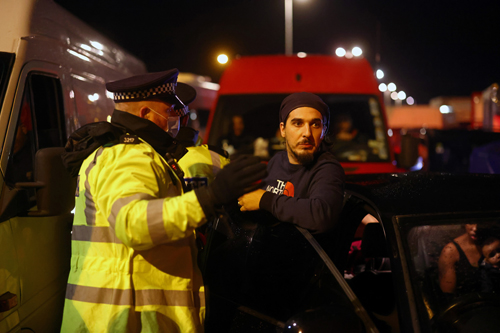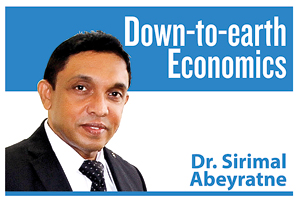From Dover to Calais
View(s):
Police officers ask a man to move his car at the port of Dover, Britain December 23, 2020. REUTERS/Simon Dawson.
If you think of travelling from London to Paris or any other European city, perhaps, the most enjoyable 8-hour journey would be by an international bus. The bus would take you to the port of Dover in England, enter a ferry anchored at the port, and park on a vehicle-parking deck along with many other vehicles – buses, trucks, vans, and motors cars. Passengers can leave the bus and enjoy a one and half hour cruise tour by ferry. Once the ferry reaches the port of Calais in France, they can again board the bus which would leave the ferry and drive to Paris on the road. All the vehicles which drove on the left-hand side of the roads in the UK, should now drive on the right-hand side in France, as per different road rules.
If you consider a fast travel mode, you might choose the high-speed train service – Eurostar, which would complete the one-way journey in two and a quarter hours. The Channel Tunnel or the Eurotunnel, lying below the seabed was opened for fast travel between London and Paris in 1994. Traveling by train is the fastest travel mode between London and Paris, competing well with air travel between the two cities. People can also travel in their private vehicles which can be carried by either ferry or train between the ports of Dover and Calais.
“Biggest vehicle park”
This week, it was utter chaos at Dover. Last Sunday, France closed its border with the UK so that ferries carrying passengers and trucks were not able to sail from the port of Dover. The UK’s trade with the EU is worth US$ 580 billion and, it accounts for nearly a half of the UK’s total trade. Therefore, chaos resulting from the closure of the UK’s main entry point to the EU was unprecedented. Each day about 10,000 trucks use the port of Dover to cross to the EU through the port of Calais. By Wednesday, about 3,000 trucks were stranded miles along the roads approaching the port of Dover, according to international news media.
People in the UK used to say that it is the “biggest vehicle park” in England. A chaotic situation was followed by other miseries too. These trucks were going not only to France, but also to other destinations in Europe carrying goods for 1000s of kilometres. While some of them were going from the UK to other European destinations, the others were the trucks returning from the UK after bringing the goods to the UK. The drivers need their food and drink as well as washroom facilities. And it is the winter season with temperatures dropping to around 10 – 12 degrees Celsius. And after all, it is Christmas time, when Europeans were looking forward to completing their work and getting together with their families. The chaotic situation was worsened as more than 50 countries around the world including the EU countries cancelled their London-bound flights. Both in-coming and out-going passengers were stranded too.
The families began to worry about their dear ones whom they would be missing for Christmas in the UK as well as elsewhere. British residents were also worried about a possible supply shortage for Christmas and the New Year; early signs of the supply shortages were also seen with already empty stalls in the supermarkets as the consumers panicked.
On Monday, British Prime Minister Boris Johnson assured that he and French President Emmanuel Macron were working to unblock the border as fast as possible. By Wednesday, however, there was some relaxation of the travel ban; it allowed travellers and truck drivers to cross the UK-France border with a proven record of a negative test for coronavirus. Even though it did not help much to ease the chaotic situation, at least it created a hope for moving forward rather than being stranded in the UK or France.
Roots of the chaos
There were two reasons for the chaos. One is the outbreak of a new COVID variant in the UK – in the county of Kent, where the port of Dover is also located. The UK with over 2 million COVID positive cases, is one of the worst-affected countries in the world. It was reported that the new variant is rapidly infectious, making the COVID issue worse than ever before. It is not yet clear whether the new vaccines which have been just released is an answer to it. As possible precautionary measures, while France closed the UK border, other countries followed suit.
 Even though it was the immediate cause of the problem at the port of Dover, the chaos was already gathering momentum there, because the Brexit transition by the 1st of January was approaching around the corner. The chaos at the port of Dover reflected the natural panic for preparation for the Brexit. One side of the problem is that goods that are coming from the EU will be expensive for both the consumers and the producers in the UK. The attempts for stockpiling in the UK before the Brexit have called for increased transportation and truck movements through the port of Dover. While the businesses try to adjust for the time after Brexit, the authorities were also attempting to prepare for border controls between the UK and the EU; it has brought about new documentary procedures to follow, resulting in complications and time delays at the border and rules which neither the UK nor the EU had followed earlier. It is in this context that the outbreak of the new COVID variant added to the chaos.
Even though it was the immediate cause of the problem at the port of Dover, the chaos was already gathering momentum there, because the Brexit transition by the 1st of January was approaching around the corner. The chaos at the port of Dover reflected the natural panic for preparation for the Brexit. One side of the problem is that goods that are coming from the EU will be expensive for both the consumers and the producers in the UK. The attempts for stockpiling in the UK before the Brexit have called for increased transportation and truck movements through the port of Dover. While the businesses try to adjust for the time after Brexit, the authorities were also attempting to prepare for border controls between the UK and the EU; it has brought about new documentary procedures to follow, resulting in complications and time delays at the border and rules which neither the UK nor the EU had followed earlier. It is in this context that the outbreak of the new COVID variant added to the chaos.
Herd immunity
What is important to understand is, while, the origin of COVID may be due to a natural cause; the degree of its spread in different countries was largely due to human error – either for not taking action because its economic and political costs may be greater or for taking action but with “loopholes” for various reasons. The latter indicates the deteriorated “rule of law” through which the lockdown affects some, but not everyone. The point is very clear as the spread of virus has gone from bad to worse in some countries, whereas it was well under control in some other countries.
For most of the advanced countries, it was the first reason: They are quite integrated with the global economy so that the transactions and transportations are greater. Any serious lockdown at the beginning would have resulted in significant economic losses. In that sense, poor countries could afford to bear the costs of lockdown because they didn’t have much to lose, but it was not so for the rich countries which were reluctant to adopt lockdowns because they are bound to lose much.
A related concept that justified the loose attitude for lockdown was the “herd immunity” to the spread of virus. Herd immunity refers to allowing for “free spread” of the virus among the larger segment of the population which would eventually develop the communal immunity system so that the spread of the virus naturally subsides. The flip side of the concept of herd immunity is that it is not the fact that each and everyone will develop the immunity system; the elderly and the vulnerable will have to bear the fatal cost, while the stronger and the healthier people will strengthen their immunity system against the virus.
Disintegration
An unexpected random event like the present global pandemic issue is not a good argument for disintegration from the global economy. The social and economic cost of the pandemic is obviously large as we have seen in 2020 but staying disintegrated and avoiding the benefits of integration may not be worth for that.
Once the pandemic is over, the world economy will revive and progress with even more integration, leaving the isolated behind. For all our readers, we wish for new hopes and new beginnings in 2021.
(The writer is a Professor of Economics at the University of Colombo and can be reached at sirimal@econ.cmb.ac.lk and follow on Twitter @SirimalAshoka).


